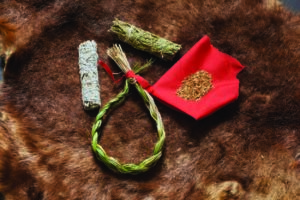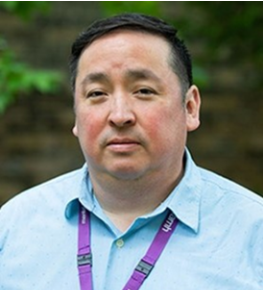This blog post was written by Michael Milward, Director, Special Projects, Anishnawbe Health Toronto
“We call upon those who can effect change within the Canadian health-care system to recognize the value of Indigenous healing practices and use them in the treatment of Indigenous patients in collaboration with Indigenous healers and Elders where requested by Indigenous patients.”
– Call to Action #22, Truth and Reconciliation Commission of Canada, 2015
In September of last year, people across Canada saw first-hand the racist and cruel treatment Indigenous people receive in some hospitals and institutions through Joyce Echaquan’s livestream video while she lay dying in a Quebec hospital. The need for culturally safe care, centered on Indigenous practices and ways of knowing, is more evident today than ever before. Leadership by Indigenous-based health and healing is needed to help break the status quo in which Indigenous people and communities continue to experience significant healthcare disparities and preventable early death and morbidity.
Colonization has had many devastating repercussions for the Indigenous people of North America, as they were stripped of their land, family and culture, and deprived of their traditional knowledge and practices related to health and well-being. Knowledge that was shared through generations related to plant medicines, ceremonies, and teachings that maintained and supported positive health, is on the verge of disappearing. This knowledge came under attack during assimilation policies like the Residential School System and was forced underground by government policies banning ceremony and making the practices illegal. Today, it is estimated that 85% of Indigenous people in Ontario live in urban centres. Without a forum for land-based teachings, the reclamation and preservation of traditional knowledge about medicines and ceremony proves to be challenging for Indigenous people living in an urban setting.
“Attending ceremonies provides a sense of identity, builds confidence, provides positive support. I am learning to become whole through my identity and culture.”
– Anishnawbe Health Toronto Client
Anishnawbe Health Toronto (AHT), the accredited community health centre serving the Indigenous community in Toronto, has developed a unique model that provides healthcare and healing guided by the teachings of Traditional Healers, Elders, and Medicine People. Western health-care practitioners work side by side with Traditional Healers to build a healthy, strong Indigenous community by looking at health holistically and helping clients to overcome barriers to health and living a good life; barriers such as homelessness, poverty, trauma, abuse and addiction. In addition to traditional practitioners, clients can access traditional medicines and participate in ceremonies such as Sweat Lodge, Smudge, and Naming Ceremonies. Connecting to identity and culture are at the core to finding a healthy path for all clients.
As one of the only Indigenous health centres in Canada with Traditional Healers on staff full time, Anishnawbe Health sees every day how colonization has severely diminished Indigenous teachings, practices and ceremonies in Canada, and we know that support to ensure this valuable knowledge is shared with the next generation is critical. To date, AHT’s efforts to address this gap for its own needs have been done on an ad hoc basis, without any dedicated resources. Yet, AHT has recognized a need to provide structured training in a supportive environment for future Traditional Healers in the urban context, to support the reclamation and preservation of traditional knowledge and to pass the teachings from generation to generation.
AHT is not alone in identifying this gap. A consultation with Elders, Healers, Traditional Teachers and Ceremonialists across Ontario concluded there was overwhelming support for a foundational training program for Osh-ka-be-Wis, or Traditional Helpers. With seed funding from donors to Anishnawbe Health Foundation, AHT is embarking on developing this training program with the aim of accelerating the learning for this vital resource for the community.
My community’s view of health starts with individual action – we all have the responsibility for our own health and wellness. At the same time, to find mino-pimatisiwin, a good path, we need the support of family, community and a connection to land, culture and identity. On today’s National Day for Truth and Reconciliation, all Canadians have it in their power to walk a good path by answering the TRC’s Calls to Action and standing in solidarity with innovative Indigenous-led, community-based solutions.
About Michael
Michael Milward is from Beardy’s & Okemasis’ Cree Nation, near Duck Lake, Saskatchewan. Michael has successfully supported innovative and transformational initiatives for First Nations, Inuit and Métis, first in the post-secondary education sector and now in the health care sector, particularly in the area of Mental Health. As the recently appointed Director, Special Projects at Anishnawbe Health Toronto, Michael is working closely with Executive Director Joe Hester, to implement the Foundational Training Program for Osh-ka-be-wis and future Traditional Healers, Ceremonialists and Traditional Teachers (Traditional Knowledge Training Program).
To learn more about Anishnawbe Health Foundation or to make a donation to support the Traditional Knowledge Training Program, visit www.supportanishnawbe.ca


One Response to “Reclaiming Traditional Healing Practices”
Kathy H
I am a First Nations woman with a background in social work and very interested in learning more about traditional healing and how to integrate it into the western medicine health model in B.C. Although there are more of our people getting stronger, there are still so many that are lost and hurting. Any information on how I can get involved would be greatly appreciated.
•